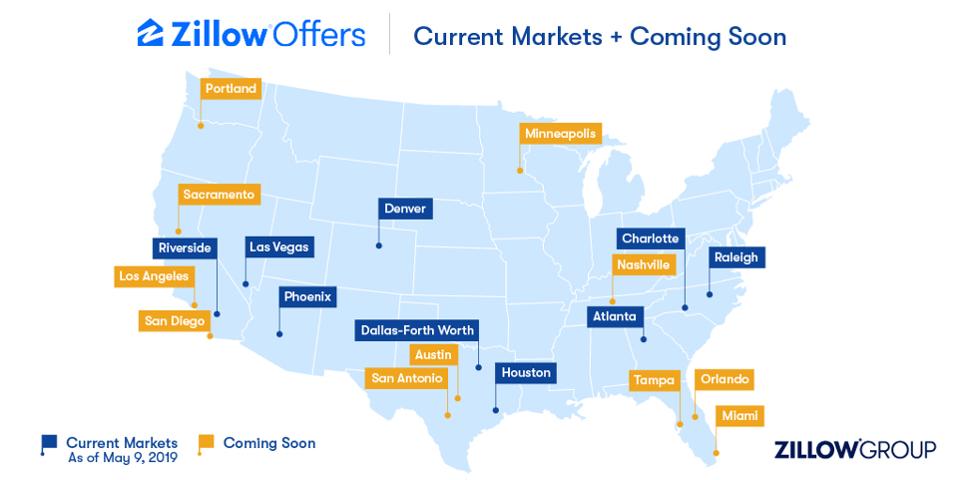Bed: 4Baths: 2Sq Ft: 2391

If you want my thoughts on the Zillow Offers program, I will share them with you. However, I want you to understand that I’m not a fan of Zillow. Let me share my personal story with you. In 2014 I decided to list my home for sale, my wife at the time thought she would help price the home, so she pulled up Zillow only to find out that our home we had spent over $350,000 building was only valued on the zestimate at $262,000. So as you can imagine, we didn’t use their number. We relied on professional in the market place to assist in pricing and ultimately selling the home. After some time we sold it for $326,000 a big difference than the zestimate. Now you understand why I’m not a fan.
On the topic of their home buying program, I’m still on the fence. I have read a couple of articles about it recently and still not sure if this will be what puts an end to Zillow. Couple that with some poor investments the unrest from real estate agents, real estate investors and for that matter homeowner who feels taken advantage of from Zillow. The real estate world is not liking Zillow, and that sentiment grows stronger day by day. You wanted to know more about the home buying program. I have heard agents voice their opinion of ethic violations with it. Their thoughts are if you have a platform where you are telling the world via the internet what the value of a home is and then your willing to buy that home at a discount that could be a conflict. I understand there are agents and investors who do a similar process every day, the big difference is Zillow is under the control of the FCC since they are a publicly traded company. Not to mention that so many homeowners believe the zestimate is accurate. For now I’m not saying it’s an ethical nightmare for Zillow but it is certainly a controversial one. I mentioned that I have read a couple of articles so in complete transparency I want to share the article from Forbes written by Samantha Sharf a Forbes Staff Writer.

In its first-quarter earnings report out Thursday, Zillow Group showed stronger-than-anticipated growth in the home-buying business it launched last year. The program, known as Zillow Offers, has been met with skepticism by Wall Street and housing economists, but the Seattle-based company clearly sees the model as its path forward.
Zillow purchased 898 homes and sold 414 in the first three months of 2019. Revenue from the homes segment was $128.5 million, with a pretax loss of $45.2 million. Zillow ended the quarter with 993 homes in inventory, worth approximately $325 million.
By comparison, from April 2018—when the home-buying program launched—through December 2018, Zillow purchased 686 homes and sold just 177, generating $52 million in revenue and losing $27.2 million.
“Zillow Offers is working, and we are leaning in,” declared Rich Barton, Zillow cofounder and CEO, in an interview immediately following the earnings release. “We tapped the accelerator and the car moved. We’re out on the highway now.” The company also said Thursday that it will expand Zillow Offers to 20 markets by the end the first quarter of 2020, up from 9 currently. Those include high prices and densely populated markets like Los Angeles and Miami, as well as up-and-coming markets like Austin.
Zillow shares have plummeted close to 40% in the last year, closing trading Thursday at $33.57 from a high of $65.42 last summer. Investors have struggled to digest the pivot from a low-cost ad business to an expensive home-flipping operation. A problematic update to its Premier Agent program, which in 2018 accounted for 67% of revenue, also led to higher-than-average ad churn and further spooked investors.
Overall revenue for the quarter was $454 million, up 51% from a year ago, but the net loss also expanded to $67.5 million from $18.6 million. In three to five years, Zillow anticipates turning the revenue mix upside down, bringing in around $20 billion a year from its homes segment and around $2 billion from its media business.
That would require moving about 5,000 homes a month and capturing close to 1% of nationwide home sales, a feat that it’s not yet clear Zillow—or its many competitors—can pull off. The closest is startup Opendoor, which in March said it was buying and selling close to 3,000 homes per month. Founded in 2013, Opendoor is in 23 markets and valued at $3.8 billion.
Most people know Zillow—and subsidiaries including Trulia, Streeteasy and Naked Apartments—as a place to browse for homes and find out how much their friends’ houses are worth. Last April, the Seattle-based company entered the on-demand home sales market with Zillow Offers. Homeowners in nine markets can now solicit purchase offers from Zillow. The company buys the home, makes necessary renovations, and lists it for sale on the open market. Zillow’s goal is to turn each home in 90 days.
In February, Barton replaced Spencer Rascoff as CEO. Barton, who cofounded Zillow in 2004, served as its first CEO before passing the baton to Rascoff ahead of the 2011 public offering. Previously head of Expedia, which he founded within Microsoft in 1994, Barton was uninterested in running another public company. He says he returned this year because he believes consumers are finally ready for a change in the home-buying process.
In the current second quarter, which coincides with the traditional spring home-buying season, Zillow expects to generate $230 million to $245 million in home sales revenue, and an adjusted loss of as much as $55 million. Total revenue for the quarter is expected to be between $569 million and $594 million, with adjusted losses as much as $5 million.
Shares were up sharply immediately following the after-trading earnings release.

Bed: 4Baths: 2Sq Ft: 2391
Bed: 4Baths: 2Sq Ft: 2327
© 2017 copyright, All Rights Reserved